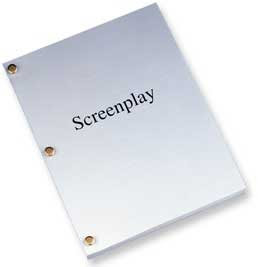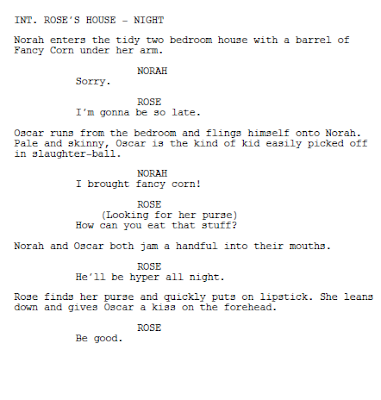And then there's "Elizabethtown," which is generally perceived as something that went wrong, which it did; or something that was terrible, which it wasn't. At least, not all of it. You see, with Elizabethtown; something strange happened - in that, we saw the very best and the very worst of Cameron Crowe. There are moments of true magic, and there are moments where it's almost cringe-worthy watching. The blame has mostly gone one of two ways. One way being "Orlando Bloom sucked," which he did, although; it wasn't really his fault, which we'll talk about soon --or-- that the script was too cheesy, which is wasn't - although I think maybe Crowe thought it was, and had a crisis of faith midway through shooting; which may explain how scattered the movie is.
So what is going on with this film? Strangely, at the beginning, the film is awful. It begins with an Orlando Bloom voice-over, which is one of the most unconvincing voice-over's in the history of cinema. Who knew Bloom could act so badly without a camera on? The way the scenes are directed and cut are also majorly problematic. The seamless feel of 'Maguire' and 'Famous' are gone, and we're left with clunky, awkward edits; which don't even flow continuity-wise. We feel like we're watching fifty different takes, cut together. That's true, probably; most films have multiple takes. But here it really shows.
Cameron Crowe made a film that he wanted to dedicate to his Father, and it was set in Elizabethtown. Weirdly, the film gets much better when we finally get to Elizabethtown. But up until that point, when it's set in Oregon, it's one big struggle. It's almost like, on some spiritual level; the film was at home in Elizabethtown but was alien everywhere else. It just doesn't feel like a real movie until twenty five minutes in. Naturally, this isn't very acceptable, and is a likely reason why most viewers lost faith.

Orlando Bloom is the wrong actor for the movie. I think this is a perfect example of bad casting. I feel sorry for Bloom (actually, not too sorry, he earns pretty well,) but this just isn't his kind of role. The screenplay was calling out for a Tom Hanks, or a Jack Lemmon, someone we believe in. Orlando Bloom, for all he tried, just didn't come across as a human being capable of any feeling. At least not as an actor. It's like that joke from "Friends" when Joey does terribly at an audition because he 'wasn't believable as a human-being.' Well, in Liztown; the character that's needed is like William Miller from "Almost Famous," he needs to be uncool, the blessed uncool. But with Bloom, you just can't buy it. He wouldn't get talking to a girl all through the night and then meeting her at sunrise, he wouldn't get the pure magic of a mix CD. The reason I feel sorry for him is that he really does try, he gives everything. And it probably is good acting, but it's not the right acting. It's not what a Cameron Crowe film needs.
But this is a film that's essentially about moments. It's about meeting someone as the sun rises when really you should be getting ready for work, it's about playing "Freebird" despite the fact you're about to get electrocuted, it's about running through a cemetery and feeling the joy of life, it's about taking solitary road trips, it's about breaking up with a girl when you're not even together and it's about learning to tap dance. THAT, is what Cameron Crowe is great at. He is the KWAN at that. And Crowe gets it right, a LOT in this picture, and he's never really gotten the credit for it. The all-night phone call scene is magic; and his use of Tom Petty's music, is magic; and the whole end sequence of the film is magic.

But overall, the film isn't magic. So what happened? A large part of it is that a film was made. And you can't force a film to be amazing. You just can't. "Elizabethtown" was a beautiful, moving, and funny screenplay. When I first read it some time in 2004 I absolutely fell in love, and was certain this would be the greatest movie of all time. It's what every Cameron Crowe fan hoped for. But how can a director live up to that pressure? The problem is: I think Cameron Crowe believed the hype. His genius at choosing perfect music for his movies had always been amazing to me. But I remember seeing him interviewed around the release of this movie; and he seemed almost smug, even lightly arrogant about how great he is with music, rather than humbled by it. And he seemed sure about himself, and the project, in a way that seemed different to how he was going back five years to when he made 'Almost Famous.' It shows when you watch the film. Some of the music fits almost *too well*, and it doesn't have the emotional impact that the director would have hoped.
When I read the screenplay, I was in love. When I first saw the film in the cinema, at the London Film Festival all those years back: I was angry. Angry for the first half of the film. I couldn't grasp Bloom's performance, or the fake sounding voice-over, or the awkward performances from Baldwin, Greer and Sarandon. But then after about thirty minutes or so, everything seemed to sink into place more, and I started to enjoy myself. By the end of the two hours, I felt true, pure, JOY. There really was MAGIC in the movie. It was inspiring, exciting, romantic and uplifting. If 'Jerry Maguire' and 'Almost Famous' are both a solid 9 out of 10, then 'Elizabethtown' is a solid 4 out of 10 yet also a solid 12 out of 10. It's everything and nothing, it's great and terrible, terrible and great. It's Crowe the artist, trying to live up to his other films; against the weight of a big-budget and a studio-endorsed movie star fresh out of that 'Pirates' thing.
Now, when I watch it; I find myself being forgiving. Underneath the many flaws, is Cameron Crowe's big-beating-heart. When he's on form, he is the epitome of a 'Kid In The Front Row,' when he's off form - he's still better than pretty much everyone else. When Cameron Crowe interviewed Billy Wilder, shortly before his death; Wilder said "Jack Lemmon was my everyman." That's one thing that Cameron Crowe hasn't found. Woody has his Keaton, Ephron has her Hanks, Capra had his Stewart - what Crowe needs is his everyman. And that's when he will truly become the legend that he very nearly is.











